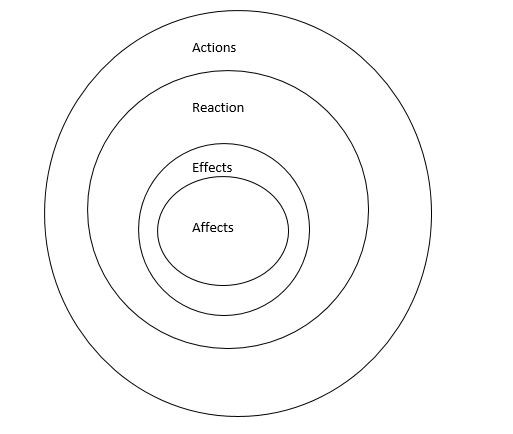Question
Statements: All affects are effects.
> All effects are reactions. All reactions are actions. Conclusions: I. All actions may be reactions. II. Some reactions are not actions. III.All reactions are affects. In each of the questions below are given three statements followed by three conclusions numbered I, II and III. You have to take the given statements to be true even if they seem to be at variance with commonly known facts. Read all the conclusions and then decide which of given conclusions logically follows from the given statements disregarding commonly known facts.Solution
All reactions are actions (A) ⇒ conversion = Some actions are reactions (I) ⇒ possible concl. ⇒All actions may be reactions (A). Hence, I follows. Here, all the given statements are positive statements and conclusion II is a negative conclusion. As we know that no negative define conclusion can be drawn from the positive statement, we can say that conclusion II will not follow. All affects are effects.(A) + All effects are reactions.(A) = All affects are reactions.(A) ⇒ conversion ⇒ Some reactions are affects.(I), Hence, conclusion III does not follow. Alternate method: Minimal possibilities: 
If detA = 3, detB = 2, then det(AB) =?
If sin x + sin 2x = 1 and cos x + cos 2x = 0, find x.
5, 24, 47, 76, 113, ?.
- What is a hierarchical, decentralized system used to name computers, services, or resources on the internet or private networks?
A group of 20 boys can complete a task in 15 days. Similarly, 24 girls can finish the same task in 20 days. If the ratio of the e...
27, 28, 30, 34, 42, ?
A circle with radius 5 units is inscribed in a square. What is the area of the square?
A and B initiated a business by investing Rs. 6,000 and Rs. 3,000, respectively. Their investments were made for 8 months and 'm'...
A basket contains 4 yellow balls, 10 green balls, and 6 white balls. If two balls are taken out one after another without putting the first one back, fi...
In the question, two equations I and II are given. You have to solve both the equations to establish the correct relation between x and y and choose the...
Relevant for Exams:



